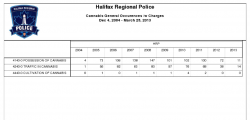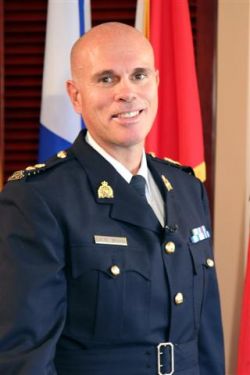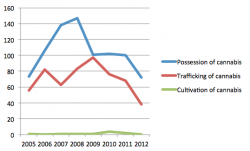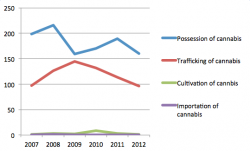Halifax Media Co-op
News from Nova Scotia's Grassroots
Cannabis Q&A with Halifax Regional Police chief Jean-Michel Blais
Why is the total number of drug charges up in HRM while the number of marijuana charges is down?

Halifax Regional Police numbers from 2004 to 2013. (2004 and 2013 numbers are only partial numbers.)
Federal marijuana laws may be growing stricter, but local enforcement of those laws is mellowing out, HRP Chief Jean-Michel Blais told the Halifax Media Co-op last week.
Over the winter, Nova Scotia witnessed high-profile marijuana raids, and Canadian cannabis laws tightened last November.
In December, RCMP in Nova Scotia arrested an Olympian, a doctor and 27 others after an 11-month investigation, and seized 2,207 marijuana plants, $100,000 in cash, $250,000 worth of cannabis production equipment and four long guns. And earlier this month, the RCMP raided a medicinal marijuana club in HRM, the Halifax Media Co-op reported.
Despite a six percent increase in total drug charges last year, however, Halifax Regional Police numbers show marijuana-related charges are actually down in 2012 from previous years.* RCMP stats, which reflect larger cannabis-related busts, show a similar trend.
Federal drug laws may be increasingly restrictive, but Blais said Halifax police are taking a measured approach to enforcing them.
For instance, a new pilot program on the peninsula employs sentencing circles to intervene when young people get involved in dealing drugs. HRP is also targeting higher-level drug dealers as opposed to smaller dealers, Blais said.
The following is an edited partial transcript of the Halifax Media Co-op’s interview with Blais. You can hear the full interview above by clicking "download file."
HMC: When the 2012-13 police budget was released recently, it revealed drug charges were targeted for a five per cent increase, and they actually increased by six per cent last year. However, cannabis-related charges dropped over 2011 to 2012. I was looking at both the HRP numbers and the RCMP numbers. Last year’s HRP numbers showed the fewest trafficking and possession charges in the entire period from 2004 to 2012, and the RCMP’s numbers reflect a similar trend. And I’m wondering why that is?
JMB: That’s a good question. …It’s interesting when we see drug charges—they can tell us different stories. For example, if we see an increase in charges, does that mean we have more drugs out in the street? Or does that mean there is better enforcement, or more targeted enforcement? And it’s difficult to say immediately whether it’s one or the other. I would say in most cases, there’s a more targeted enforcement that goes along there.
...As you mention, from 2011 we see a marked decrease in the numbers. What we’ve done from our criminal investigative division, which has our drug unit in there, our integrated drug unit, is targeting more the mid-level dealers as opposed to the individual small dealers. If we have more information, and especially if one of our patrol units is in the process of doing an investigation, and sees an individual, and does an investigation and immediately finds an individual in possession of or in the process of trafficking drugs, then obviously there will be charges laid against that individual. However in most cases what we try to do is we try to properly target, according to the information [and] intelligence that we have, those individuals who are at the higher levels. Not at the highest levels—that’s usually for the RCMP to take care of, with their federal unit, but for us to target the mid-level dealers.
Because what we’re finding is a correlation between the mid-level drug dealer and some of the weapons and violence that we have in our society, in our communities. So if we can target those individuals who are usually packing a firearm, then it gives us a bigger bang for our buck when it comes down to getting drugs off the street as well as getting firearms off the street that could eventually be used in a shooting.
HMC: So that would possibly explain why the trafficking charges and peak possession charges peak at around 2009, 2008, and then there’s a sort of tapering off until this year?
JMB: If you see 2007 and 2008, that was when the height of it was, and then there’s a leveling off until 2011, and in 2012 it’s gone down. And if we were doing any extrapolations, we would see a further decrease. I don’t have all the facts in front of me with regards to our operations, but I know one thing is for certain: That we have been targeting the more mid-level drug dealers. So some of these seizures are more significant in terms of the quantity as opposed to having a numerous number of small quantity seizures.
HMC: So is it fair to say then that police officers in HRM, either RCMP or HRP, are using discretion in enforcing marijuana laws?
JMB: Well discretion is part of our work. If you take a look at the Criminal Code in Section 495 1-A, it says a peace officer may affect an arrest if they have reasonable grounds to believe that an individual has committed an infraction. So there’s always that police officer discretion. There’s also the question of what is more important, as mentioned before. If you have information about an individual who is selling on a street corner a small quantity of drugs versus somebody who is selling a large quantity of drugs, then we’re going to be focusing our efforts on the large quantity. However, if that street corner individual [with the small quantity of drugs], for example, is causing problems for the neighbourhood, we’re definitely going to be targeting that individual as well.
HMC: When you’re saying you’re targeting the mid-level dealers and anyone who might cause a problem in terms of public safety or has a large number of drugs, I’m wondering, at what level does that discretion come into the picture? Is it a management, top-down directing when to use this discretion?
JMB: No. Management is there to provide the necessary tools to allow our police officers to do their job. The police officers [and] the front-line investigators who are in a better position than we are to be able to determine where they want to go, what do they want to target in terms of having an effect on the drug subculture.
The biggest thing today is that what we’re looking at is no longer in the past stove-piping our investigations whereby we’re just going to be looking at a single drug. Here is Jimmy who is selling some dope on the street corner, and we’re going to spend resources to be able get him. What we’re looking at is criminality is now a very complex thing, and you’ve got James, who is now selling not only marijuana but he’s also selling guns, he may also be involved in prostitution, he may be involved in the sale of stolen cell phones for example. And so there’s a whole plethora of where we could focus our investigations on.
…The key is the immediate threat to public security. If we see there is an immediate threat to public security, that becomes our number one priority. Very often that threat comes from the usage of firearms. And so hence if we see there’s an individual who is involved in the drug culture and also has firearms, then we’re going to be putting the emphasis on him.
…
HMC: Where is marijuana cultivation versus consumption happening in HRM?
JMB: In terms of the places?
HMC: Yes.
JMB: That’s a good question. I don’t have the facts in front of me, but from what I’ve read, it can occur anywhere. From my own experience across Canada, it can happen in very nice neighbourhoods. …Technically a grow-op can be one plant. …They can be done anywhere you have electricity, basically.
HMC: Back to the targeted practices for marijuana dealers, has HRP implemented diversionary practices specifically for marijuana dealers?
JMB: Yes, and in fact, we support very much diversionary practices, and when you’re talking about diversionary practices, it’s in terms of the judicial system and the approach that we take from a legal point of view. We have in the past supported alternative measure programs, and in fact we have an alternative measure program going on right now, that takes young offenders against whom we have a very complete set of evidence, and we approach them and we say to them, listen, we know you sold drugs on such and such a date, we have all this information here, we could take you before the courts, or we can take you into this diversionary program.
It’s very much like a sentencing circle. I don’t know if you’re familiar with the concept in Aboriginal culture, of a sentencing circle, whereby an individual recognizes their transgressions if you will. … It’s before they even go to court, they’ll be given a decision whether to go to court or go through this diversionary measure, and if they go for the diversionary measure, they have to go before a circle of peers, friends, members of the community, police officers and other interveners, and basically they learn of the harmful effects of what they are doing.
We had one case, for example, where a woman was looking at this 15-year-old boy, and said, ‘I remember when you were six years old in my kitchen, and how such a sweet boy you were, and now you’re selling dope to hurt people on the street.’
And these have profound effects. And what that does, in this case so far, and this is a pilot project we’re doing so far on the peninsula, we’ve had five individuals who have gone forward, and basically what they’ve done is not only have they recognized what they’ve done and are remorseful for it, but we’ve given them and helped them to get out of the spiral of selling drugs and doing other things that will be more productive in their lives; staying in school for example, getting a part-time job, learning a new skill so as to become a contributing member of society.
…I think we realize that taking an individual, bringing them before the courts, having them go to jail or spend any time in preventative custody only criminalizes them even further.
* The 2004 and 2013 numbers are only partial numbers, and do not account for the entire year. A new records system was introduced in 2004.
Commentaires
Criminalization and the creation of drug profits
This man is a bullshitters bullshitter.
He is ignoring the root of the problem in order to hack away at the tiny leaves of a huge tree.
1. We have a commodity.
2. Government criminalizes that commodity for ostensably no reason at all.
3. Commodity prices go up.
4. Due to the high profitability and its illegal nature, the distribution of said commodity attracts criminals (those he claims to be attempting to catch).
5. Violence surrounds the culture of said commodity via those criminals, making the acquisition and use of said commodity to be dangerous and expensive as well as attract further attention from law enforcement, which then creates new, stricter laws to attempt to reign in the violence and actual crime associated with these activities.
6. The cycle continues and accelerates, meanwhile the non-violent users of a commodity (whose use should be none of the governments business) have to suffer by paying more, risking confrontation with the law man and having to associate with unsavory and violent people.
Lets all agree that the HRP, the RCMP and all levels of government recognize the above situation I have presented. We have Alcohol prohibition as a prime example of what happens when you criminalize a normal, non-violent, voluntary interaction of human beings for political or social ends. Its a known fact of life.
So why ignore the obvious?
'Crime' would drop and all those Drug Unit cops would be out of a job.
The Prison industrial complex would suffer.
the UN and the US would bitch and moan that we've violated the UN charter.
Police officers wouldn't have easy access to free drugs.
Nor would they be able to racially target arrests as easily.
Just to name 2 or 3 obvious ones.
Solution:
Legalize marijuana.
Do not tax it, do not do anything with it.
Leave people alone to go about their daily lives doing whatever actions they choose without hurting people. Guns are legal, tageting people with guns because they posess marijuana is retarded unless they are physically harming other people with those guns. Arrest criminals, where crime is defined by injuring another human being. Period, end of story.
Seriously just fuck off, the world will sort itself out.
The site for the Halifax local of The Media Co-op has been archived and will no longer be updated. Please visit the main Media Co-op website to learn more about the organization.





